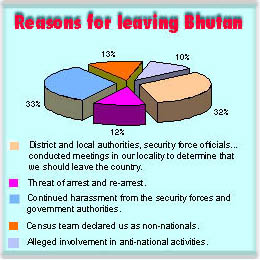 From interviews conducted with 4553
households at the time of compilation of information for this database, a list of 15
different reasons for leaving Bhutan was derived. Of these, the five main reasons in the
order of maximum number of households victimized are as follows. First, there was
continued harassment from the security forces and government authorities to make them
leave their homes in Bhutan. Second, the district and local authorities and security force
officials conducted meetings and told them to leave the country. Third, the census
officials arbitrarily declared them as non-nationals and were subsequently evicted.
Fourth, fearing arrest or re-arrest, many people fled for safety. Fifth in order is
eviction on the grounds of alleged involvement in the movement.
From interviews conducted with 4553
households at the time of compilation of information for this database, a list of 15
different reasons for leaving Bhutan was derived. Of these, the five main reasons in the
order of maximum number of households victimized are as follows. First, there was
continued harassment from the security forces and government authorities to make them
leave their homes in Bhutan. Second, the district and local authorities and security force
officials conducted meetings and told them to leave the country. Third, the census
officials arbitrarily declared them as non-nationals and were subsequently evicted.
Fourth, fearing arrest or re-arrest, many people fled for safety. Fifth in order is
eviction on the grounds of alleged involvement in the movement.
Under such circumstances the eviction of fifty seven percent of the population, documented in this database, was preceded by forcing them to sign the so called 'Voluntary Migration Forms', a document in Tibetan script undecipherable to most of the southern Bhutanese citizens. They were made to do this under threat, intimidation, torture and imprisonment by the district authorities and security forces.
Based on these findings, the reasons for leaving Bhutan can be summarised as under :
1. People taking part in the peaceful demonstration of 1990 or those who paid cash donations to the movement were targets for official harassment. They were kept under constant watch by the authorities and were liable to be arrested at any time. Upon arrest they were invariably compelled to leave the country.
2. The member[s] of the family arrested and imprisoned by the security forces were subjected to severe torture to extract statement in which they would offer to leave the country upon their release from the prison. After their release the entire family were evicted.
3. While a member of the family was undergoing severe torture in jail the government officials coerced the family members at home to offer to leave the country as a pre-condition for the release of their family member from the prison. The officials often threatened the family of dreadful consequences to their imprisoned family member(s) if they did not oblige. Under such circumstances, the family had only one option - to agree to leave the country.
4. If a member of a family, fearing persecution, fled the country, particularly after the crushed peaceful demonstration, the family left behind was ordered by the authorities to hand over the fleeing member. Failing to produce the family member in a stipulated time, the whole family had to leave the country.
5. Families whose members were suspected of having involvement in the movement were officially declared as ‘anti-nationals’. The security personnel were sent to the houses of such families and they were driven out of the country.
6. The people were threatened with re-arrest if they did not leave the country upon their release.
7. Some families were compelled to leave the country owing to continued harassment like frequent raids at night by the security force and government officials intimidating them to leave the country. Such raids involved molestation or threat of rape to female members of the family.
8. The government authorities from the district, the village headmen or the security personnel conducted public meetings in the villages where village folks were threatened with dire consequences if they ignored authorities’ order to leave the country. Several families decided to leave the country out of fear from these threats. Often the government authorities issued written orders to families through village heads ordering them to leave the country.
9. The security forces committed rape and torture during the regular house raids. In many instances, the security forces ordered the villagers to supply female ‘volunteers to help in their barracks’ and gang-raped them. The security forces burnt or demolished their houses forcing people out of their homes. These circumstances forced the people to escape to safety.
10. The census officials declared them as non-nationals during the census exercise and were forced out of the country. Since 1990 census exercise has become an annual affair.
11. As a punishment for having opposed or protested against the government policies by members of the family by participating in rallies the entire such families were subjected to compulsory labour for prolonged period of time. After they could no longer bear the sufferings, some families left the country.
***